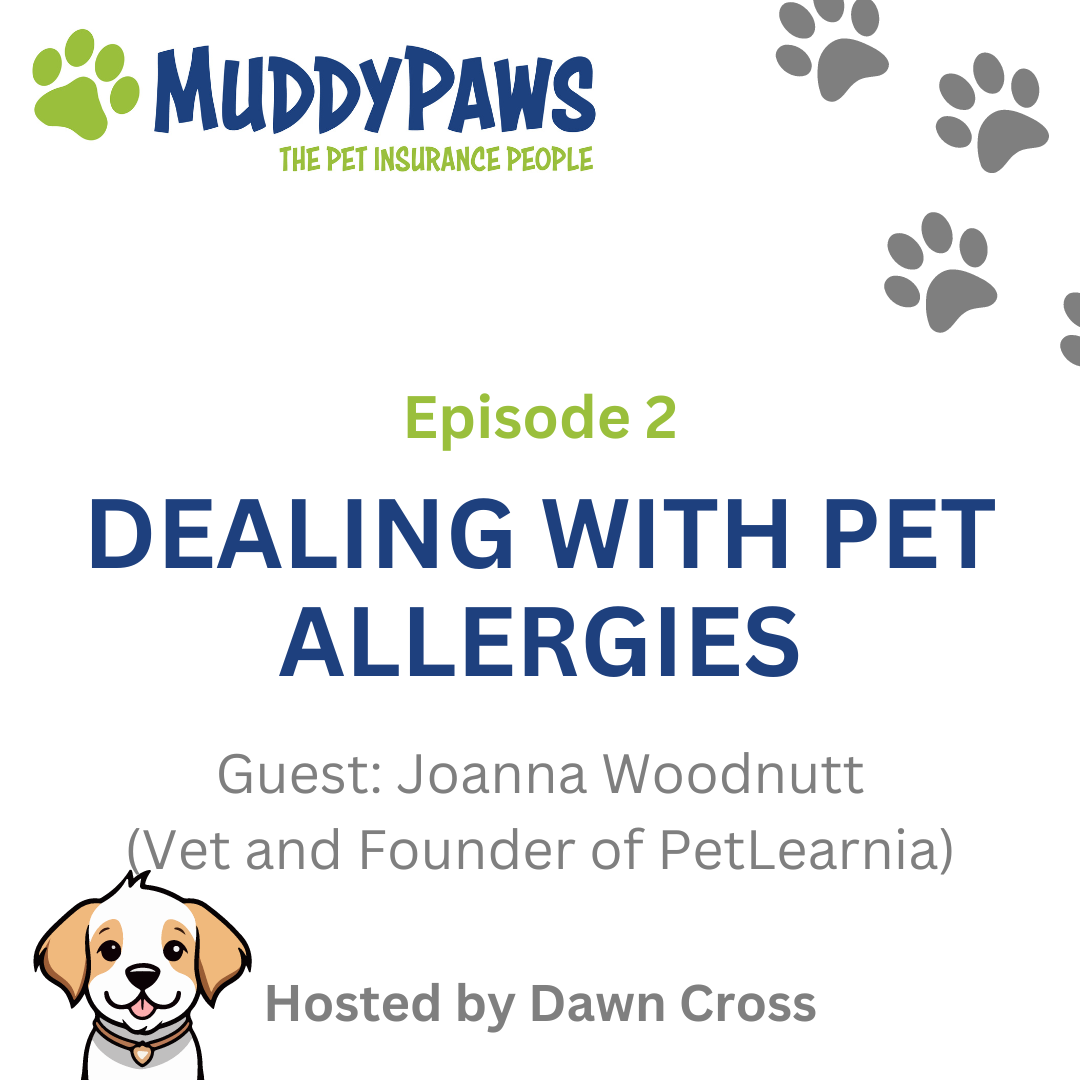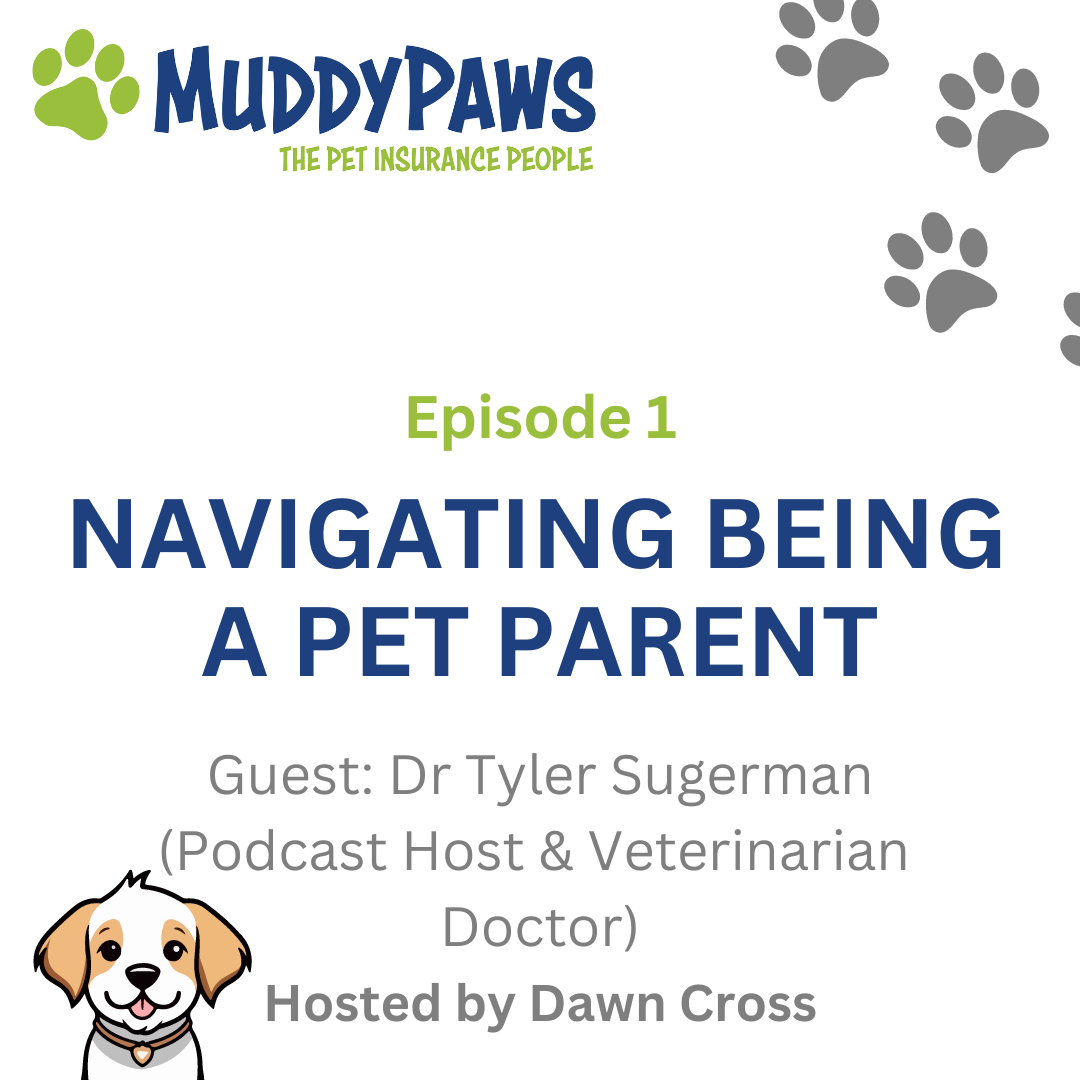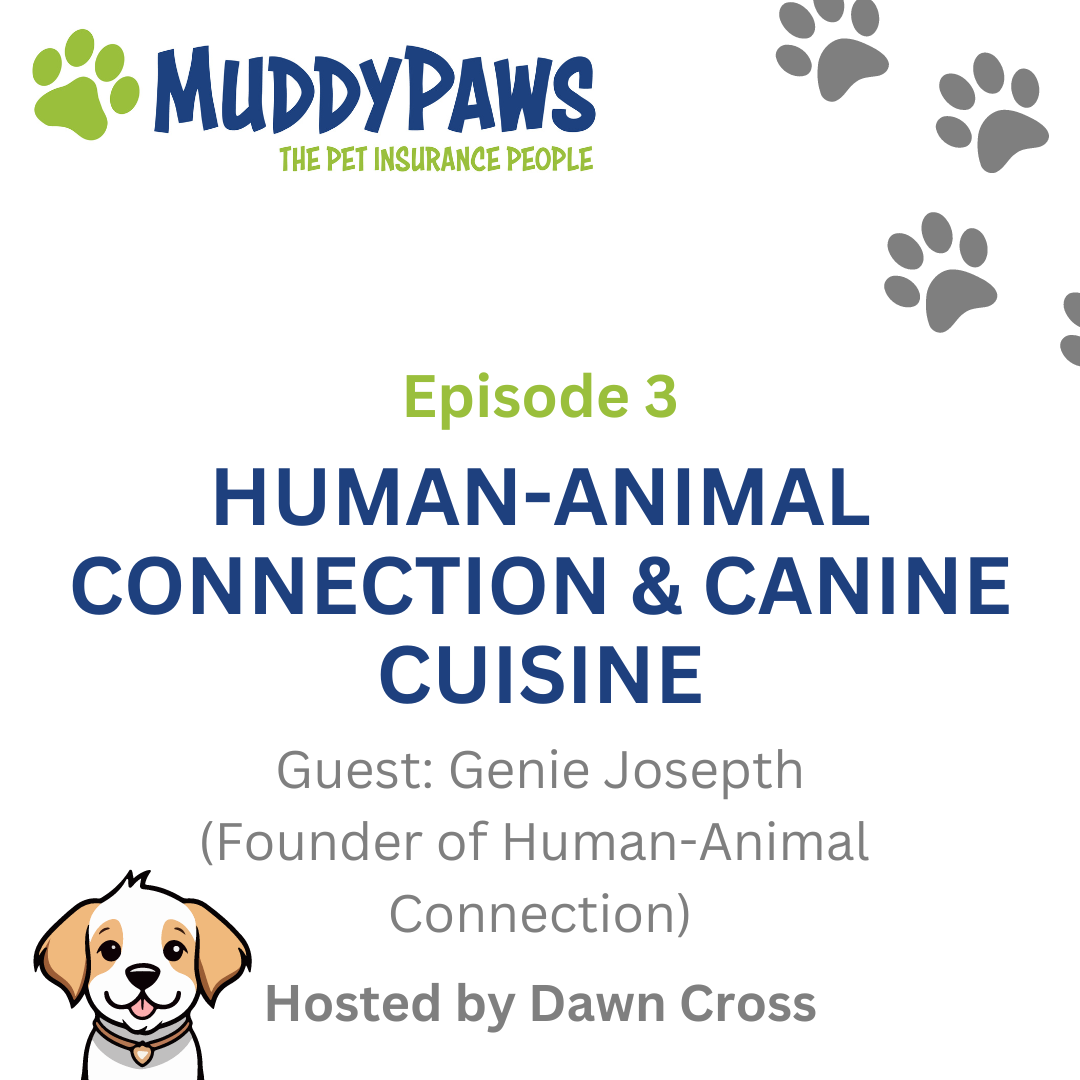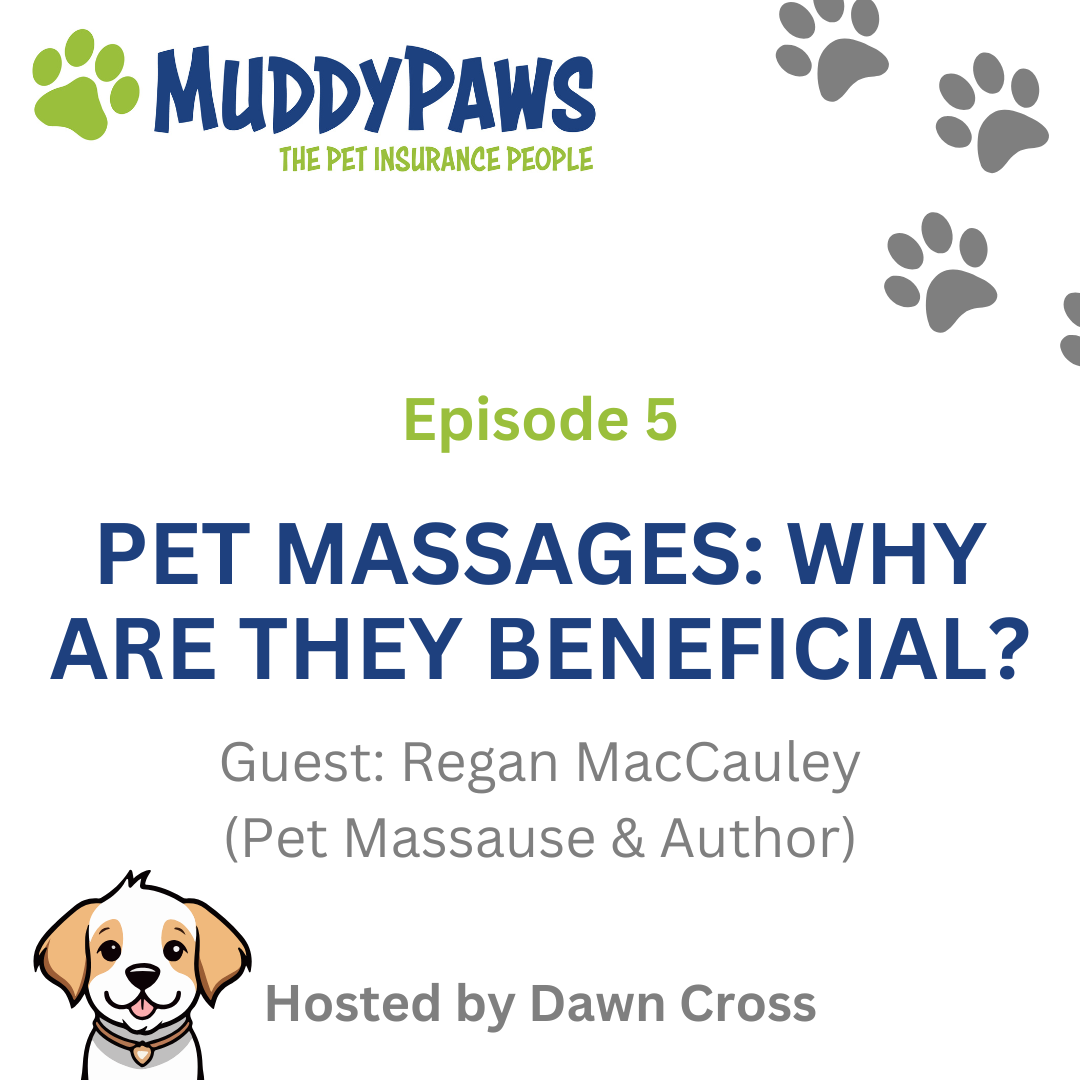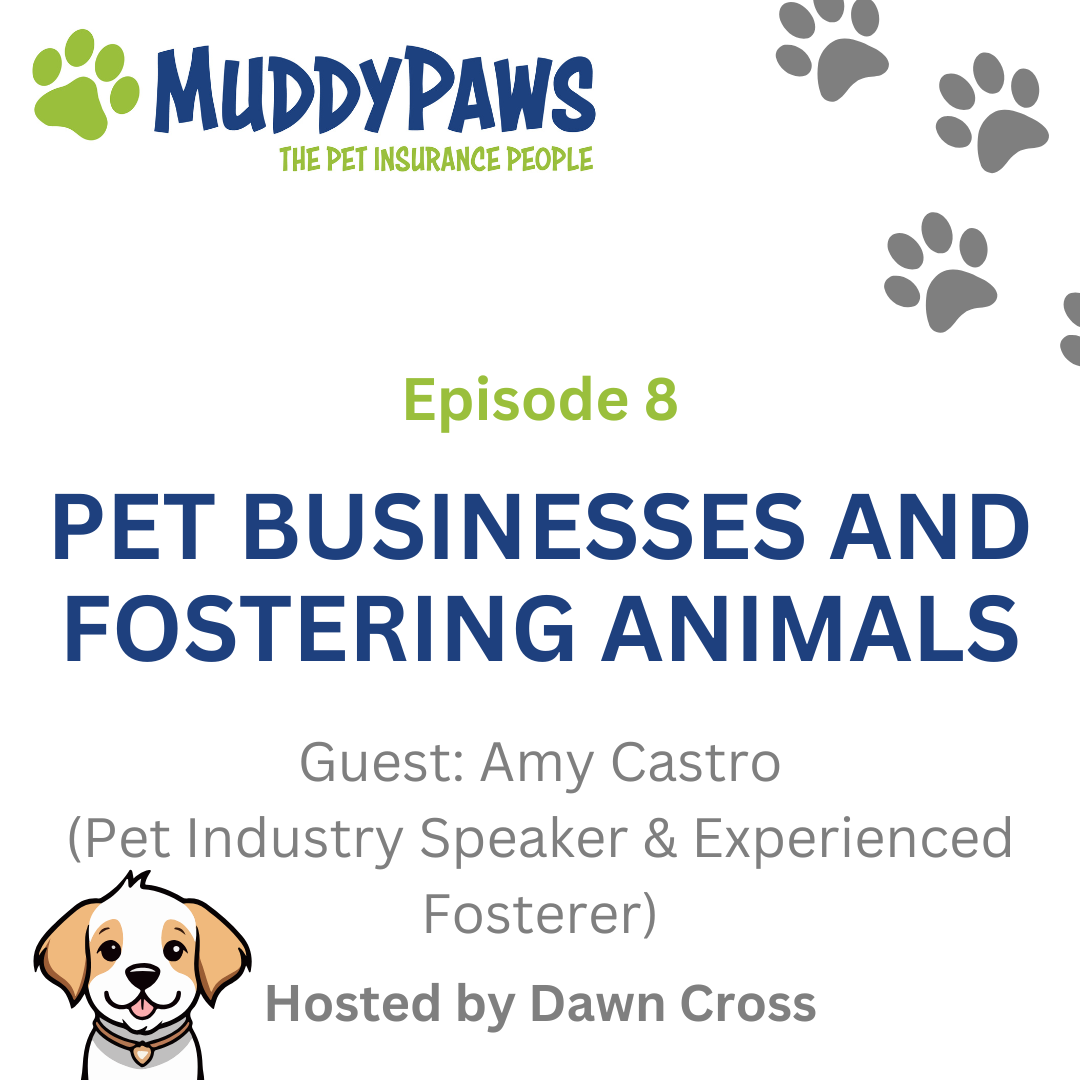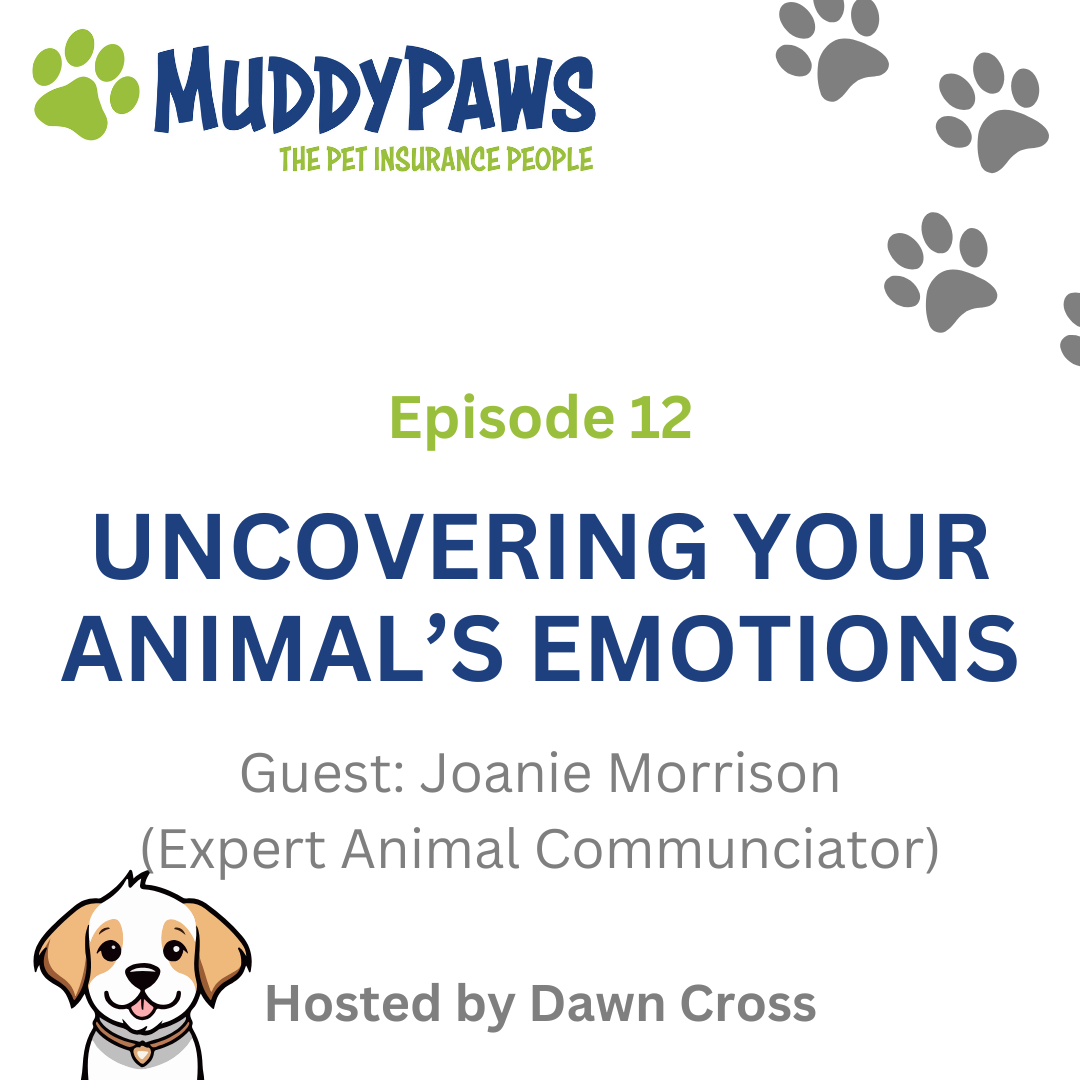Episode Transcript
[00:00:02] Speaker A: Welcome to the Muddy Paws Insurance podcast. I'm your host, Doncross, and today I'll be discussing pet allergies with Joanna Woodnutt, vet and founder of Pet Lernia.
If you enjoy our podcast, make sure to leave a rating on your favourite podcast directory.
[00:00:19] Speaker B: Bruce, if I could get you to start off, you can introduce yourself and what you get up to.
[00:00:25] Speaker C: Yeah, sure. So I'm Jo. I'm a vet and I work for, or I founded a company called Pet Lernia. So we try to make safe information for pet parents. And the way that we do that is that we use vets to write elearning courses. And the nice thing about an e learning course, rather than just a website is that by signing up to that course, we have your email address so we can email you and say, oh, everything's changed. There's a new medication or anything like that. So we've really thought carefully about how to make sure that pet owners access good information now, but also making sure they have access to that information in the future.
Definitely.
[00:01:07] Speaker B: That sounds amazing. I like the idea. It's like a course as well. So not only are they learning something, but I know majority of us humans, we like having that little satisfaction that we've got like a tick or a feeling of completion after learning something.
[00:01:25] Speaker C: Yeah, definitely. And it's all self paced. You know, you can. You can work through it and go, right. I don't really care about anatomy of the heart. I just want to find out what treatments my dog's on and why. But for some people, actually, they really do want to know, or it comes to spaying their dog and they want to actually see a video about what a spay is and how it's performed. So our content is very kind of broad and varied because most websites are just writing, you know, you might get a little video embedded or some pictures embedded, but we're trying to, like, break it up a little bit. So there's like drag and drop tasks, fill in the blanks, just little things like that, just so you can sort of check that you understand properly. So we're just trying to really sort of revolutionize how people learn information about their pets and access that information and knowing that it comes from a safe place, which I think is probably the most important thing.
Definitely.
[00:02:14] Speaker B: That sounds amazing.
[00:02:15] Speaker A: How did you come up with the idea of it?
[00:02:18] Speaker B: Was this something that accumulated over the years that, you know, this really should just be out there? Why isn't there something like this?
[00:02:25] Speaker C: Yeah, pretty much. I mean, I certainly noticed that when I was in veterinary practice when I was doing consults that I would end up explaining the same things over and over again.
But I also am quite aware that people are not necessarily in a good place to learn. They're often worried about their pet or there's a dog barking or something. They're thinking about getting back to work and they're not really able to sit down and learn there. So I was trying to think of ways I can make it easier for them. And obviously the kind of classic, old fashioned way of doing it is to give out a handout. And I tried to do that. But the problem with a handout is the printer's never working when you need it. The handout's out of date and it's. So they lose it, the dog eats it, whatever, whereas the course is in your phone and you can go back to it a year later, five years later, whenever you need to remind yourself of the next steps. So it kind of, it just kind of revolution or changes how we do updates, upgrades, that kind of client handout, and makes it more suitable for kind of modern life.
[00:03:25] Speaker B: Well, that sounds really awesome. I like that. It is. Obviously, you know, it's transportable as well. It's not like you. They have to. If you did more handouts, you know, they'll take it with them and they can even obviously share it with people. Like, look, you know, I literally have this on my phone. It's amazing. So you can easily spread that, just all the information and be like, you know, actually this is a really great resource right here and.
[00:03:46] Speaker C: Yeah, exactly. And I think especially when you've got several carers looking after the same pet, that handout is quite important because one of the things I found as a vet was that you people go home from their consultation and say the husband's brought the dog in, he goes home and his wife's like, so what's wrong with the dog? And that's where all hell breaks loose. In all honesty, and the amount of times I had phone calls from other members of the family going, can you just explain this again? So not only have I explained it in the consult the first time, I've also explained again on the phone.
While I don't necessarily begrudge people that time, because I absolutely don't, actually, they're not in a position to easily take it in. And I think everyone's time is better spent if they can go home and read about it in a safe way and not just picking up on some rubbish on Google, but that then they can come back in, they're informed and they're ready to ask the questions that they need to rather than meet and start from scratch and not knowing quite how much they know. So it kind of just enables the pet owner to kind of get up onto the same level the vet ask the questions that they actually need to advocate for their pets, because as pet owners, that you are the experts in your pets. So I don't necessarily know which medication is going to suit your pet best. And it's a real, it can really waste everyone's time and money if we try the wrong medication because you didn't fully understand what the options were. One of the things we're really trying to do is enable people to understand the options and then kind of go into the vet and be like, right, well, this says that there's a liquid version and actually tablets are never going to work for us, so I'd rather start with that. And it kind of just brings people up so they can have that discussion with their vets as equals rather than kind of feeling on the back foot all the time in the consultation.
[00:05:25] Speaker B: Now that sounds amazing as well. Like, you know, it can just skip a lot of faffing, not in, like, you know, the worst way, but, you know, there's a lot less confusion. You can kind of get more to the point as well, and then, you know, everyone else feels more secure and whatever, whatever's going on, because they can, like I said, you know, read up on it at home, which as an avid learner myself, that sounds amazing. So I'd rather be able to read up at home. And then when I come to the next appointment, I could be like, right, so this is what you were suggesting. I know what you're talking about now, at least. And then, you know, obviously discussing the treatment for the pet at the end of the day and making sure I think everyone's happy.
[00:06:04] Speaker C: Yeah. And I think that's the thing is, long term, the way that we see this working really is that vets direct pet owners to the information, say, you need to go and look at this. So we're not kind of trying to undermine your vet's advice at all. We're very much complimenting your vet's advice. And all of our writers are vets and we have another vet, a peer review vet check everything as well. So they, you know, we're making sure that a vet would actually genuinely be happy to use this. And what I really like is when our peer review vets aren't from inside the company, we get kind of specialists in and things and when get back to me and they're like, this is actually awesome. Can we use this? And they're like, yeah, that's the whole point.
[00:06:45] Speaker B: That sounds amazing. And the idea as well that obviously you're all supporting each other, bringing out the best knowledge possible. And it's, I think people feel reassured as well if it is literally written by vets rather than, you know, I mean, there might be some brilliant copywriters out there who can write really good stuff. Obviously, if they haven't got that background, the medical knowledge, it can make things just feel not as secure as if you like, this is straight from the source. Like, you know, they've been trained, they've been in there for so many years as well. You know, they've got that lived experience of working with pets as well. It's not just that. Oh, I've learned this. It's along the way as well. I've seen this and everything else. And that sounds really amazing.
[00:07:22] Speaker C: Yeah. Inside the courses, we try to kind of provide, obviously, like the, the important information, like you say, that we're taught, but also kind of our experience. So I've been working on some drugs, databases and like, writing about different drugs that you're, you might be prescribed. And, you know, the data sheet doesn't list this as a side effect, but it's like, actually me and all the other vets think this is a side effect. So it's trying to make sure that that information's in there as well and we distinguish between the two. But like just sort of saying, look, in our experience, actually, this is slightly different. Or the statistics say that 90% of pets will have this, but actually we feel it's more like 50 or whatever it is. So just trying to make sure that the information is actually from our experience as well. And that's where those specialists do come in really handy because they do see so many more cases of those particular diseases. So they can kind of sense check that and go, actually, yeah, we would agree. Like the statistics, they were last done in 1997 and they could do with an update.
[00:08:22] Speaker B: That sounds amazing. So moving on slightly. Obviously, we were kind of chatting previously about, obviously summer is coming up. You've got a lot of a pollen floating about the air already, to be honest. I know my car is absolutely covered with it. And obviously, I think some people forget that, obviously, like pets do have allergies and reactions to kind of like harsh spring turns or, you know, pollen or whatever, even just like if there's loads of certain type of plant and stuff. So I guess my, my first question for you is like, you know, how can you tell if maybe your pets are having, you know, kind of like hay fever or allergy problems to like, the seasonal change?
[00:09:00] Speaker C: Sure. Well, I mean, yeah, allergies are really, really common. So I think we say like one in ten dogs has got an allergy, which is quite a lot. And actually my own dog is unofficially diagnosed allergic because her symptoms are just too confusing. But the normal, the classic case I see as a vet is a dog coming in with an ear problem. Now, adult dogs don't really get ear mites and it's pretty rare for an adult dog to get an ear infection. Sometimes you get. These dogs do a lot swimming, but other than that, they're kind of. An ear infection is the first warning sign for me as a vet that an allergy is quite likely.
And actually, one study looked back at dogs that had known diagnosed with allergies and 90% of them had a history of ear infections. So that's like the absolute, like, classic. And if an adult dog has more than two ear infections, I'm going, me, me, me. We need to go in and we'd have a look at the dog. The other one that we find, really, and it kind of goes together with this, is chewing and licking the feet. So if I have a dog that comes in with an ear infection, the first thing I do is look at his feet and if it's got white fur there, they often go a little bit pink from all the licking and it's really obvious and I say, oh, looks like he's been licking his feet as well. And the owners will almost certainly go, yeah, always this time of year, he starts licking his feet or, yeah, he always licks his feet. It's only the front two. It's only the back too. It's all four, whatever it is.
But it's. Again, statistically, it's about 85% to 100% of atopic dogs have a history of licking and chewing at their feet. So some people say, oh, yeah, he bites his nails. Like, no, dogs don't really do that. He probably is actually just itching.
Other classic symptoms, so changes in skin colour, hair loss, sore eyes and sneezing are less common. So, like, our hay fever symptoms are less common. Sneezing is about 20%. So not as common, but definitely something to keep an eye out for.
Itchy bottoms as well. So recurrent anal gland problems is another one that we do sometimes see. And it's unclear whether the anal gland problems are actually causing it, or whether they're just, you know, the classic anal gland problem is scooting their bums and actually, is a bum itchy, or do they actually have an anal gland problem? And especially if they're coming in with the current problems and they've got another symptom definitely worth exploring, whether allergies could be a cause.
Some dogs also have. So that's quant, that's environmental allergies. Some dogs have food allergies as well, combined with environmental allergies, and some will just have food allergies. Food allergy dogs tend to have, like, a chronic mild diarrhea, maybe rumbling tummy a little bit more often, something like that. But only about one in ten allergic dogs has a food allergy. So it's not that common. And a lot of people kind of jump to, oh, my dog's itchy, it must be x in their food, and they get overexcited about a food allergy, but it's actually really relatively uncommon. And certainly the chance of randomly guessing what ingredient it is is pretty much nil.
[00:12:00] Speaker B: Definitely. And it sounds quite interesting as well, is that we need to remember that, you know, the symptoms you're talking about, it won't necessarily be like, how humans present as well. And they're like, oh, you know, licking the feet a lot. They don't think about it, but like, yeah, they're probably, you know, the pads themselves are quite itchy, but people don't tend to think about, actually think it's sometimes quite a normal dog behavior. So it's also trying to guess when it's not normal. And actually, okay, you're licking them quite a lot, there's a problem and just going like, oh, they're obviously just, you know, giving themselves a bit of a, I don't know, a bit of agreement, because some dogs also like doing that, because obviously you've got the behaviors of just like, you know, maybe they do that because it's just a habit that they have. And obviously the biggest problem of all is obviously we can't talk to them. So it's really just trying to figure out, isn't it, the behaviors, is it normal? Is it abnormal? And figuring out from there, it's like, okay, well, what could it lead to? And everything else, I think it's really.
[00:12:56] Speaker C: I would say that if a dog is just licking their feet and they have no other symptoms, how, like, yes, you could take them into the vets. Yes, you could investigate an allergy. But it comes to the thing where, how are you going to treat that allergy if you find it? Well, you're going to give them drugs that have side effects. So you've always got to do a benefit risk analysis here. And if their only symptom is mild, so mild foot licking that you're not convinced they even have an allergy, it's probably not something that you're going to rush down. And that's what I'm saying with my dog is that she will randomly be itchy in like February, and then the next year it'll be June and there's like no thing to it, but it's quite, it passes quite quickly. And I'm kind of, we started investigating it and I was like, you know what? I'm not going to be putting her on drugs all year round just in case she's itchy at some point. We'll just, you know, if it becomes more regular, if it becomes more of a problem for her. And that's, that's something that you do have to consider, is how stressful is it to be feeling itchy all the time. And, you know, if your dog is repetitively licking, if you are noticing an increase, then, yeah, absolutely go get it checked out. But if, you know, if it's so mild you're not even sure, then I wouldn't be rushing to investigate an allergy. It's quite a long, drawn out process.
[00:14:11] Speaker B: Yeah, it definitely can be. So, obviously, moving on, then what do you recommend? Obviously, you know, the biggest kind of step would be, I guess, if you. If there really is an issue.
[00:14:21] Speaker A: So you would take them to the vet to investigate.
[00:14:23] Speaker B: But what can you recommend? Any steps that parents could take where, you know, maybe just to help avoid the allergy or just reduce, I guess, the suffering slightly. So, you know, if they do get kind of itchy feet, but it's not too bad, you know, what can they do to, you know, give them the most comfort possible without taking that next big step, which is obviously investigating.
[00:14:47] Speaker C: Yeah, definitely. I mean, going to the vets and investigating if there's any chance that they are in discomfort with the itching is sensible, because these things do get worse over time. So the earlier you can kind of start looking into it, it's definitely something that's worth doing. Like I said, it's also quite a long, drawn out process. So what you don't want to do is not start and then a year later be like, oh, God, now we've got to start.
The first thing I would say not to do is to change their diet in a panic. Because, like we said, not very many dogs are food allergic. And one thing that's really worth noting is that the first thing your vets may do in diagnosing these once they've ruled out fleas, because a lot of aged dogs do just have fleas. Once they've done that and checked, there's no mites, no fleas, there's nothing else obvious. They can't diagnose an environmental allergy until they've ruled out a food allergy and they have. The only way to rule out a food allergy is all these fancy tests people will try and push on you, but they're not very good, they're not reliable. And scientific testing has shown that what they're going to do is they're going to do a diet trial. And the problem is, it's finding a novel diet, protein, for your dog to have. If you see an allergy and you go and change their diet and then do it again and do it again, because they're still itching, that's for fewer proteins that your dog can have, which makes it more and more difficult to find one and potentially more and more expensive, because they end up in a very complicated diet. So it is definitely worth just putting the brakes on diet change until you've spoken to your vet, for sure.
In terms of other things you can do at home, like I said, this isn't instead of a vet visit, but definitely, as well as and going back to pet Lernia, one of the things we really focus on is the stuff that your vet definitely doesn't have time to tell you. And these home management things are definitely some of those. So if I had, you know, hour long consultations, which veterinary dermatologists have, then we would go into a lot more detail about this. But most veterinary consultations in the UK are like, 1015 minutes. We just don't have time.
So there are a few things you can do. So try to basically reduce the number of pollen or allergens that land on your pet. So you might be able to change where you walk. But I wouldn't stop taking a dog to the park just in case they're allergic to the grass. But you might say, okay, well, let's bathe them after a walk, or at least wash their feet down. That can help. Help massively regular bathing, definitely. But you do have to be careful not to dry out the skin too much, because the skin barrier is really important to keep those allergens out. And if you keep desiccating the skin by constantly using harsh shampoos then you are going to damage the skin barrier. So using quite a conditioning shampoo, but sort of semi regularly can definitely help as well.
Dusting, vacuuming, even using an air purifier. I had a case that was on regular allergen vaccines, so immunotherapy and then they had a reaction to that and we decided to stop that and they got an air purifier at home. And actually the dogs managed just this air purifier which would have paid for itself very quickly, actually.
So, yeah, that was definitely worth a try. Ear management. So if they are those that are having regular ear flare ups, then your vet can recommend an ear cleaner that can just try and kind of keep them under control a little bit. It won't be when you've got an ear problem, will often prescribe antibiotics, drops. And then we see these patients come in, they're like, oh, yeah, I've been applying the drops, you know, one once a week for the next eight months. Oh, my God, those antibiotics don't do that. It'll be an actual in the ear cleaner. So it might be antiseptic, but it won't be antibiotic. So antiseptic ear cleaning around the house as well. Reducing the amount of chemical cleaners is sometimes a thing. There was a massive sort of fad of using those vax shake things on the carpet and we had a lot of allergic dogs with really red bellies just from lying on the carpet where these vaccines have been used. So it is just sort of thinking a little bit about what you're using around the home, maybe looking for steam cleaners rather than chemical cleaners and that sort of thing. So there are lots and lots of kind of minor things, but they should definitely be used alongside medical therapy, especially if your dog's uncomfortable immunotherapy, which basically involves injecting very small amounts of the allergens into your pets. They learn to cope with them and that can be really effective in about two thirds of dogs can reduce or completely stop the need for medications. And the other thing is just to go back over diet if they are food allergic. If your vet does diagnose them with food allergic, then allergen management from food is going to be incredibly important. But there are other things you can do with the diet as well. We talked about skin barrier.
Adding in omega three s to their diet is definitely very well proven to help. And there's also some evidence that probiotic support can help with skin allergies as well. So those are two little things that you can look at adding, by all means, chat to your vet about them. They'll probably agree with me, but they're things that kind of vets don't often remember to mention because we're going, okay, let's go. Drugs, drugs, immunotherapy, what have we got time to talk about? And those sort of little things we can do at home often kind of get left out of the conversation.
[00:20:03] Speaker B: No, definitely. There's some really great steps and I think as well, like, you know, even if people think about it, those steps obviously also help with humans and our reactions to things as well. So not only is it beneficial to your pets, it's also beneficial to you. So it's like, you know, win win, you know, even if they have to think, well, I've got to do all this, it's like, actually, you never know. You might find that actually you breathe a bit better when in your home if you have like an air purifier or even just more regular dusting. You know, I think people forget that although, you know, dust is never ending. Like having dusting around is actually makes a huge difference to the environment.
[00:20:37] Speaker C: Yeah, definitely. And I think it's definitely worth remembering that, like you say, not only is it going to help your dog, it's going to help you, but we also have this thing called the itch threshold. So although they all seem like incredibly minor things, a dog with allergies doesn't take very much to tip them over the edge into itching. But if you can just take all these tiny little steps, those can add up to enough. They're not itchy. So sometimes it feels like, oh, well, I'm not going to bother. Like, that doesn't seem like it's going to work. It seems like a bit more hassle. I'd rather just give them the drugs, actually. They kind of all add up. And I always used to say that medical doctors would be absolutely appalled, are handing out steroids like their sweeties for these allergic dogs when eczema is a very similar disease. And they're all about the emollient creams, they're all about the kind of improving the skin from the inside out with adding in supplements, things like that. So they would be absolutely appalled at us just throwing steroids everything. We are getting better as vets at trying not to do that. But it is definitely kind of one of those things that there are still improvements to be made in how we treat these dogs holistically and look at everything we can do to try and reduce that some people even put. I talk about washing the feet, but some people even put, like, little poor covers over their dog's feet for walks. Those allergens actually never come in contact, which is quite cute.
[00:22:00] Speaker B: I think that's really good. And as well, you never know. It can be protecting the pores anyway, so you never know. There might have. There's always like hidden glass or there's some sort of stuff where obviously people are negligent and just chuck their rubbish everywhere. So you never know. Those can be useful in the long run for so many different things anyway, like, absolutely.
[00:22:18] Speaker C: And if your dog's going to tolerate them and it's not your problem putting them on, then, like, why not? The only thing I would say is just watch out. If you do have dog that's prone to chewing and swallowing things that they. You're not. They're not unattended with pore covers on because I have had to do surgery to remove one. So. Crikey.
[00:22:36] Speaker B: They pretty much kind of told them how much they thought about their shoe covers and by eating it.
[00:22:42] Speaker C: Yeah, pretty much, yeah. It was actually for a wound, so it wasn't in quite the same situation, but they'd used it instead of a bandage over a small wound and dog had just eating it.
[00:22:54] Speaker B: Wow. So do you, is there anything else you'd like to add before you wrap up the episode today?
[00:23:01] Speaker C: No, I don't think so. In terms of allergies. I mean, we've got an allergy course. It's in its finishing stages now. So that will be going live soon and it will be great to get people on there, get people using it. A lot of these tips that I've given today will be on this as well as anything else that any of my researchers could find that there's scientific evidence for. We also have an option on those courses for people to feed in, what help for them, because I really want it to be kind of a community thing as well. But unlike sort of Facebook or forums, vets are going to have eyes on, so you can feed that information on, but if it sounds like it's going to do more harm than good, then we won't publish it. So when you see those tips on the courses, you can be kind of confident that a vet's okayed that those go on there.
So it's just worth keeping an eye out for that course going live, maybe following us on Facebook so that you can. Or Instagram if you're Instagram, so that you can see when it goes live. And we normally do for the sort of first week after a course launch. We normally do like a little coupon code to get it free. So yeah, please do keep an eye out for that. If you have allergic dogs, that's pretty.
[00:24:09] Speaker B: Well, thank you so much for your time today.
[00:24:12] Speaker C: Oh, thank you, dawn. It's great to speak to you.
[00:24:15] Speaker A: Thank you to my guest today, Joanna, for chatting about her tips and advice on pet allergies. If you're interested in signing up to pet Lania, please click the link in the description.
I have been your host, Dawn Cross, and make sure to click follow for more episodes.
Muddypause takes pride in keeping things simple and our goal is to provide a reliable insurance policy that is well delivered and gives you peace of mind. Intelligent underwriting, a user friendly application and outstanding customer service ensure we stand out from the crowd and provide the best.
[00:24:45] Speaker B: For your furry friends.
